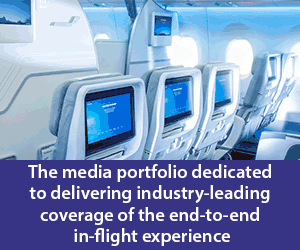Inflight editor Alexander Preston summarises the latest happenings across IFEC and cabin technology.
While British Airways has been reflecting on its own centenary, it’s also taken the opportunity to look forward over the next 100 years, and explore what the future of aviation will look like.
Conducted by Foresight Factory, the ‘BA 2119: Flight of the Future Report’ brings together the results of one of the largest global consumer travel surveys of its kind, with industry experts and futurologists exploring new technological, scientific and socioeconomic drivers of change.
The research found that passengers are increasingly asking for a more personal and social travel experience. Almost two-thirds of respondents say that they would welcome the chance to pick and choose the elements of their journey that they would like to upgrade and enhance such as food options (including freshness and nutritional values) and entertainment, both in terms of recentness and quality content. There was also a strong trend towards a more adaptable space that can be configured to an individual’s needs.
A lot of these expectations chime with feedback garnered by Qantas back in January about futuristic long-haul flights.
Some of the most frequent suggestions from customers for the Australian airline’s ‘Project Sunrise’ include the request to provide “sense of separation” experiences where passengers can be social but then “zone out” with either virtual reality relaxation zones, audio mindfulness experiences, or through the broader in-flight entertainment; spaces to do gentle exercise/stretches, promoting circulation and comfort; wireless, noise-cancelling headsets and innovative cabin designs across the entire aircraft, considering both seat and non-seat spaces to focus on a broad range of traveller needs including comfort, sleep, dining, entertainment and state of mind.
BA also identified Li-Fi as an innovation to fundamentally transform in-flight experiences.
Now, an EU consortium is looking to commercialise Li-Fi by forming a closed value chain with partners representing the components, chipsets, systems and applications sectors and research institutes. ELIoT (Enhance Lighting for the Internet of Things) will run for three years.
The project is good news for the technology which is already being explored by Airbus, Astronics, Oledcomm and Latecoere, and others, to deliver speeds up to 100 Mbps per seat, and make light work of Li-Fi.
The editor’s comment is published weekly as an accompaniment to the Inflight e-newsletter. If you do not currently receive our email updates, you can subscribe here.







